 Photo: Esther Dyson
Photo: Esther DysonChain, chain, chains…. the seduction of big-box stores call to us in the deep, sultry sound of discount, and the lure of low prices are hard to deny. But things are changing. As suburb residents flee back to the city, the scale of monotony is being downsized and localized.
National chains are becoming local brands.
The average Walmart store is close to 200,000 sq ft; that’s the size of Facebook’s new office, four football fields, and three-hundred sixty-three New York studio apartments. But in 1998, Walmart tested a 40,000 sq ft Neighborhood Market store, and now has 200 of those around the country. Not be outdone by itself, Walmart then cut their stores in half again to the 15,000 sq ft Marketside prototype that focuses on fresh food. This month, they’re down to a miniscule 10,000 sq ft in an existing building on the college campus of Arkansas. And soon, Walmart will materialize in New York City, one of the last bastions of place.
But it might all end up alright; don’t shed a tear just yet.
The U.S. Constitution’s basic tenet is based on the federalist rule of national governments allowing States to operate independently. National chains can do the same. I like to call it corporate federalism: the notion that national brands can allow local stores to operate independently. Imagine a business where novelty isn’t fed to us as New and Improved!, but as genuine difference and discovery. The national chain’s local brand would depend on the area’s local identity and needs.
Here’s an example. Duane Reade recently responded to chain disdain from young hipsters and yuppies in the Williamsburg section of Brooklyn by including something most neighborhood drugstores do not have: a specialty beer bar that features nine local, craft and imported beers – and the store allows for tastings.
Duane Reade is the first to undercut local businesses not just on price or assortment, but on experience. And not just a brand experience (any old chain can do that), but a local one. In an ideal world, corporate federalism would mean local chains purchase goods and services from other local businesses and return more of their revenue to the local economy – just like local businesses do.
Essentially, national chains would create local brands within their umbrella that would benefit from the efficiencies of the larger organization. Local employees would be free to adapt the brand to their neighborhood. It’s a tall order, but with the behemoth giant Walmart actually becoming smaller, and Duane Reade customizing their stores to match neighborhoods, it’s not too far off.
Our shared experiences no longer need to be those of purchases and parking debacles from Ikea, Walmart and Starbucks. Instead, national chains have the opportunity to build and expand upon the je ne sais quoi feeling that defines a sense of place.
If chains operated as local brands, the money would stay local. The focus would be on the depth of the experience, not the scale of the box. Economies would improve. And there wouldn’t be too much to crow about anymore. Perhaps there wouldn’t be as many local jobs since the national headquarters would remain elsewhere, but that is the reality of scaling a business, and the changing nature of work. Our jobs can be location-independent, but the places we live cannot.
Indeed, if chains were operated as local brands, it would be hard to find a weak link.